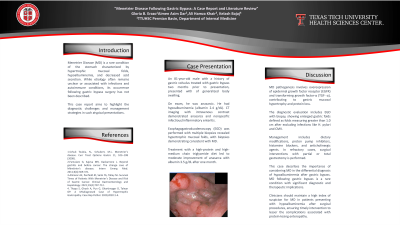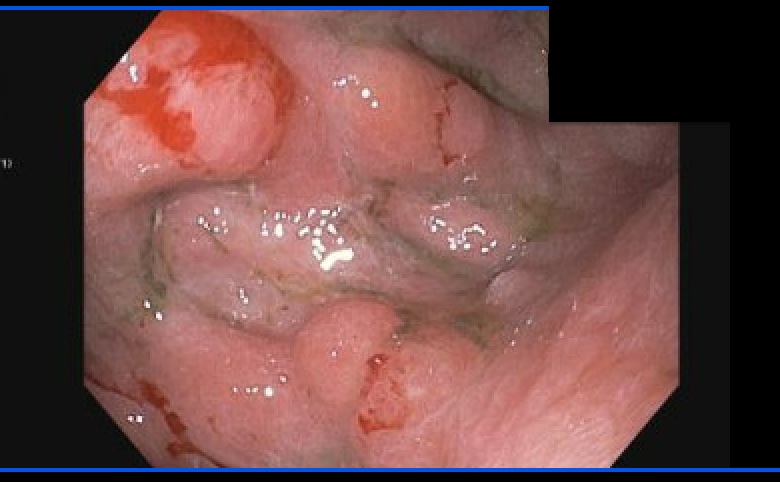Monday Poster Session
Category: Stomach
P3395 - Menetrier Disease Following Gastric Bypass: A Case Report and Literature Review
Monday, October 28, 2024
10:30 AM - 4:00 PM ET
Location: Exhibit Hall E

Has Audio

Gloria B. Erazo, MD
Texas Tech University Health Sciences Center
Odessa, TX
Presenting Author(s)
Gloria B.. Erazo, MD1, Aimen Asim Dar, MD1, Ali Hamza Khair, MD1, Kelash Bajaj, MD2
1Texas Tech University Health Sciences Center, Odessa, TX; 2Texas Oncology, Odessa, TX
Introduction:
Menetrier Disease (MD) is a rare condition of the stomach characterized by hypertrophic mucosal folds, hypoalbuminemia, and decreased acid secretion. While etiology often remains unclear or associated with infections and autoimmune conditions, its occurrence following gastric bypass surgery has not been described. This case report aims to highlight the diagnostic challenges and management strategies in such atypical presentations.
Case Description/Methods: An 81-year-old male with a history of gastric volvulus treated with gastric bypass two months prior to presentation, presented with of generalized body swelling. On exam, he was anasarcic. He had hypoalbuminemia (albumin 2.4 g/dL). CT imaging with intravenous contrast demonstrated anasarca and nonspecific infectious/inflammatory enteritis. Esophagogastroduodenoscopy (EGD) was performed with multiple biopsies revealed hypertophic mucosal folds, with biopsies demonstrating consistent with MD. Treatment with a high-protein and high-medium chain triglyceride diet led to moderate improvement of anasarca with albumin 3.5 g/dL after one month.
Discussion: MD pathogenesis involves overexpression of epidermal growth factor receptor (EGFR) and transforming growth factor-α (TGF- α), contributing to gastric mucosal hypertrophy and protein loss. Diagnostic evaluation includes EGD with biopsy, showing enlarged gastric folds defined as folds measuring greater than 1.0 cm after excluding infections like H. pylori and CMV. Management includes dietary modifications, proton pump inhibitors, histamine blockers, and anticholinergic agents. In refractory cases, surgical interventions with partial or total gastrectomy is performed. This case describes the importance of considering MD in the differential diagnosis of hypoalbuminemia after gastric bypass. MD following gastric bypass is a rare condition with significant diagnostic and therapeutic implications. Clinicians should maintain a high index of suspicion for MD in patients presenting with hypoalbuminemia after surgical procedures, ensuring timely intervention to lesser the complications associated with protein-losing enteropathy.

Disclosures:
Gloria B.. Erazo, MD1, Aimen Asim Dar, MD1, Ali Hamza Khair, MD1, Kelash Bajaj, MD2. P3395 - Menetrier Disease Following Gastric Bypass: A Case Report and Literature Review, ACG 2024 Annual Scientific Meeting Abstracts. Philadelphia, PA: American College of Gastroenterology.
1Texas Tech University Health Sciences Center, Odessa, TX; 2Texas Oncology, Odessa, TX
Introduction:
Menetrier Disease (MD) is a rare condition of the stomach characterized by hypertrophic mucosal folds, hypoalbuminemia, and decreased acid secretion. While etiology often remains unclear or associated with infections and autoimmune conditions, its occurrence following gastric bypass surgery has not been described. This case report aims to highlight the diagnostic challenges and management strategies in such atypical presentations.
Case Description/Methods: An 81-year-old male with a history of gastric volvulus treated with gastric bypass two months prior to presentation, presented with of generalized body swelling. On exam, he was anasarcic. He had hypoalbuminemia (albumin 2.4 g/dL). CT imaging with intravenous contrast demonstrated anasarca and nonspecific infectious/inflammatory enteritis. Esophagogastroduodenoscopy (EGD) was performed with multiple biopsies revealed hypertophic mucosal folds, with biopsies demonstrating consistent with MD. Treatment with a high-protein and high-medium chain triglyceride diet led to moderate improvement of anasarca with albumin 3.5 g/dL after one month.
Discussion: MD pathogenesis involves overexpression of epidermal growth factor receptor (EGFR) and transforming growth factor-α (TGF- α), contributing to gastric mucosal hypertrophy and protein loss. Diagnostic evaluation includes EGD with biopsy, showing enlarged gastric folds defined as folds measuring greater than 1.0 cm after excluding infections like H. pylori and CMV. Management includes dietary modifications, proton pump inhibitors, histamine blockers, and anticholinergic agents. In refractory cases, surgical interventions with partial or total gastrectomy is performed. This case describes the importance of considering MD in the differential diagnosis of hypoalbuminemia after gastric bypass. MD following gastric bypass is a rare condition with significant diagnostic and therapeutic implications. Clinicians should maintain a high index of suspicion for MD in patients presenting with hypoalbuminemia after surgical procedures, ensuring timely intervention to lesser the complications associated with protein-losing enteropathy.

Figure: EGD showing giant gastric folds
Disclosures:
Gloria Erazo indicated no relevant financial relationships.
Aimen Asim Dar indicated no relevant financial relationships.
Ali Hamza Khair indicated no relevant financial relationships.
Kelash Bajaj indicated no relevant financial relationships.
Gloria B.. Erazo, MD1, Aimen Asim Dar, MD1, Ali Hamza Khair, MD1, Kelash Bajaj, MD2. P3395 - Menetrier Disease Following Gastric Bypass: A Case Report and Literature Review, ACG 2024 Annual Scientific Meeting Abstracts. Philadelphia, PA: American College of Gastroenterology.

